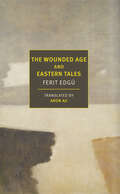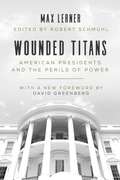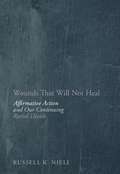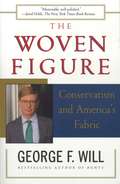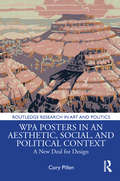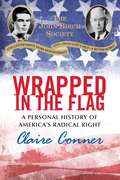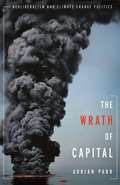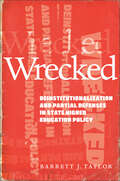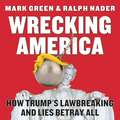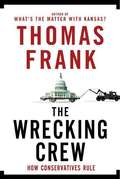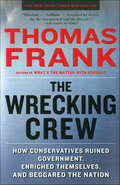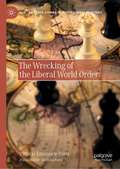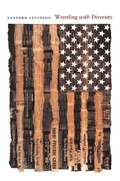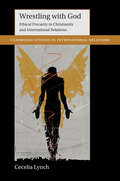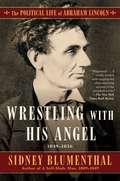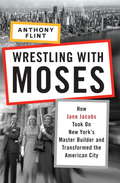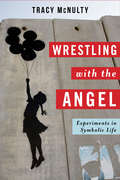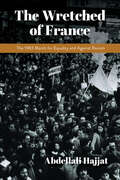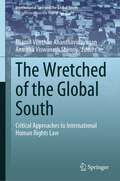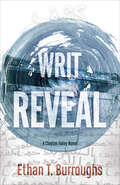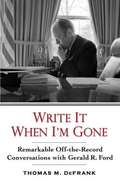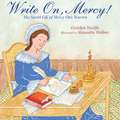- Table View
- List View
The Wounded Age and Eastern Tales
by Ferit EdgüOne of Turkey's most celebrated writers explores themes of violence, otherness, and exile through a thrilling hybrid of poetry and prose that paints a vivid picture of Turkey's conflict-torn lands.In the two books paired here, translated into English for the first time, the great Turkish writer Ferit Edgü represents complex social and political realities with startling lyricism. The Wounded Age features a newspaper reporter from Istanbul, assigned to write about ethno-national violence in the mountains of eastern Turkey. Like the narrators in Eastern Tales, he is a stranger in a region where a buried history—the state&’s violence against Armenians, Greeks, and Assyrians—continues uninterrupted with the subjugation of the Kurds. Language in this place, especially the language of outsiders, cannot be trusted. In the story &“Interview,&” an old villager tells the narrator, &“Make our photograph,&” and adds, &“Send us the pictures. No need to write us letters.&” The minimal tales Edgü tells are vivid pictures of life in the East—a house in ruins, an empty crib, wolves howling in the hills—and transcriptions of living voices. The reporter in The Wounded Age has no illusions that his story will stop the bloodletting; instead, he goes east because he knows he must open his eyes and unstop his ears.
Wounded Titans: American Presidents and the Perils of Power
by David Greenberg Max Lerner Robert SchmuhlA collection of essays on power and the American presidency from a journalist who personally knew the men inside the Oval Office. An academic and journalist, Max Lerner dedicated his life to studying American presidents. He not only wrote about the men in the Oval Office, but knew them personally, from Franklin D. Roosevelt to Bill Clinton. Lerner believed that the nature of the office transforms presidents into titans, but wounded titans, bowed and sometimes broken by forces, fate, destiny, or history, that lie beyond their control. Wounded Titans compiles Lerner’s essays on the presidency along with his presidential portraits and campaign journalism. This collection includes Lerner’s thoughts on Roosevelt’s attempt to pack the Supreme Court; Truman’s efforts to manhandle the steel industry; Eisenhower’s belief that he could control the military-industrial complex; Kennedy’s hyperactive libido and recklessness; and Nixon’s conviction that he could manipulate political process. Lerner’s personal relationship with the presidents gives these essays “a powerful immediacy” and “he is unflinching in his assessment of their effectiveness or lack thereof while in office” (Kirkus Reviews). Updated with a new foreword, Wounded Titans is the complete collection of Max Lerner’s writings on the presidency and American presidents.
Wounds That Will Not Heal
by Russell K NieliRacial preference policies first came on the national scene as a response to black poverty and alienation in America as dramatically revealed in the destructive urban riots of the late 1960s. From the start, however, preference policies were controversial and were greeted by many, including many who had fought the good fight against segregation and Jim Crow to further a color-blind justice, with a sense of outrage and deep betrayal. In the more than forty years that preference policies have been with us little has changed in terms of public opinion, as polls indicate that a majority of Americans continue to oppose such policies, often with great intensity.In Wounds That Will Not Heal political theorist Russell K. Nieli surveys some of the more important social science research on racial preference policies over the past two decades, much of which, he shows, undermines the central claims of preference policy supporters. The mere fact that preference policies have to be referred to through an elaborate system of euphemisms and code words-- "affirmative action," "diversity," "goals and timetables," "race sensitive admissions"-- tells us something, Nieli argues, about their widespread unpopularity, their tendency to reinforce negative stereotypes about their intended beneficiaries, and their incompatibility with core principles of American justice. Nieli concludes with an impassioned plea to refocus our public attention on the "truly disadvantaged" African American population in our nation's urban centers--the people for whom affirmative action policies were initially instituted but whose interests, Nieli charges, were soon forgotten as the fruits of the policies were hijacked by members of the black and Hispanic middle class. Few will be able to read this book without at least questioning the wisdom of our current race-based preference regime, which Nieli analyses with a penetrating gaze and an eye for cant that will leave few unmoved.
The Woven Figure
by George F. WillSwatches From The Century's End ...I cannot deny my past to which my self is wed, the woven figure cannot undo its thread. Louis MacNeice, "Valediction" These words express a truth of conservatism that has discomfited conservatives in the years covered by this volume. This collection of columns shows how, in the mid-1990s, conservatives fancied themselves poised to conduct a revolution, a radical reorientation of politics and governance. But in the late 1990s, they have discovered how resistant a complex nation is to being undone and rewoven. In this volume, George F. Will, distinguished political columnist and cultural critic, examines many episodes of the conservative tribulations and the liberal accommodations to the new political landscape. These writings present a map of the landscape, a guide for people perplexed by the gap between contemporary political theories and practices. With his customary linguistic flair and acerbic wit, Mr. Will tackles a wide range of subjects, including political correctness on college campuses; extreme fighting; the 1996 presidential campaign; judicial activism; ESPN; and Corvettes. These writings are history written on deadline, and together they constitute a richly woven tapestry of our era.
WPA Posters in an Aesthetic, Social, and Political Context: A New Deal for Design (Routledge Research in Art and Politics)
by Cory PillenThis book examines posters produced by the Works Progress Administration (WPA), a federal relief program designed to create jobs in the United States during the Great Depression. Cory Pillen focuses on several issues addressed repeatedly in the roughly 2,200 extant WPA posters created between 1935 and 1943: recreation and leisure, conservation, health and disease, and public housing. As the book shows, the posters promote specific forms of knowledge and literacy as solutions to contemporary social concerns. The varied issues these works engage and the ideals they endorse, however, would have resonated in complex ways with the posters’ diverse viewing public, working both for and against the rhetoric of consensus employed by New Deal agencies in defining and managing the relationship between self and society in modern America. This book will be of interest to scholars in design history, art history, and American studies.
Wrapped in the Flag: A Personal History of America's Radical Right
by Claire ConnerA narrative history of the John Birch Society by a daughter of one of the infamous ultraconservative organization's founding fathers Long before the rise of the Tea Party movement and the prominence of today's religious Right, the John Birch Society, first established in 1958, championed many of the same radical causes touted by ultraconservatives today, including campaigns against abortion rights, gay rights, gun control, labor unions, environmental protections, immigrant rights, social and welfare programs, the United Nations, and even water fluoridation. Worshipping its anti-Communist hero Joe McCarthy, the Birch Society is perhaps most notorious for its red-baiting and for accusing top politicians, including President Dwight Eisenhower, of being Communist sympathizers. It also labeled John F. Kennedy a traitor and actively worked to unseat him. The Birch Society boasted a number of notable members, including Fred Koch, father of Charles and David Koch, who are using their father's billions to bankroll fundamentalist and right-wing movements today. The daughter of one of the society's first members and a national spokesman about the society, Claire Conner grew up surrounded by dedicated Birchers and was expected to abide by and espouse Birch ideals. When her parents forced her to join the society at age thirteen, she became its youngest member of the society. From an even younger age though, Conner was pressed into service for the cause her father and mother gave their lives to: the nurturing and growth of the JBS. She was expected to bring home her textbooks for close examination (her mother found traces of Communist influence even in the Catholic school curriculum), to write letters against "socialized medicine" after school, to attend her father's fiery speeches against the United Nations, or babysit her siblings while her parents held meetings in the living room to recruit members to fight the war on Christmas or (potentially poisonous) water fluoridation. Conner was "on deck" to lend a hand when JBS notables visited, including founder Robert Welch, notorious Holocaust denier Revilo Oliver, and white supremacist Thomas Stockheimer. Even when she was old enough to quit in disgust over the actions of those men, Conner found herself sucked into campaigns against abortion rights and for ultraconservative presidential candidates like John Schmitz. It took momentous changes in her own life for Conner to finally free herself of the legacy of the John Birch Society in which she was raised. In Wrapped in the Flag, Claire Conner offers an intimate account of the society --based on JBS records and documents, on her parents' files and personal writing, on historical archives and contemporary accounts, and on firsthand knowledge--giving us an inside look at one of the most radical right-wing movements in US history and its lasting effects on our political discourse today.
The Wrath of Capital: Neoliberalism and Climate Change Politics (New Directions in Critical Theory #48)
by Adrian ParrAlthough climate change has become the dominant concern of the twenty-first century, global powers refuse to implement the changes necessary to reverse these trends. Instead, they have neoliberalized nature and climate change politics and discourse, and there are indications of a more virulent strain of capital accumulation on the horizon. Adrian Parr calls attention to the problematic socioeconomic conditions of neoliberal capitalism underpinning the world's environmental challenges, and she argues that, until we grasp the implications of neoliberalism's interference in climate change talks and policy, humanity is on track to an irreversible crisis.Parr not only exposes the global failure to produce equitable political options for environmental regulation, but she also breaks down the dominant political paradigms hindering the discovery of viable alternatives. She highlights the neoliberalization of nature in the development of green technologies, land use, dietary habits, reproductive practices, consumption patterns, design strategies, and media. She dismisses the notion that the free market can solve debilitating environmental degradation and climate change as nothing more than a political ghost emptied of its collective aspirations. Decrying what she perceives as a failure of the human imagination and an impoverishment of political institutions, Parr ruminates on the nature of change and existence in the absence of a future. The sustainability movement, she contends, must engage more aggressively with the logic and cultural manifestations of consumer economics to take hold of a more transformative politics. If the economically powerful continue to monopolize the meaning of environmental change, she warns, new and more promising collective solutions will fail to take root.
Wrecked: Deinstitutionalization and Partial Defenses in State Higher Education Policy
by Barrett J. TaylorHigher education is a central institution in U.S. democracy. In the 2010s, however, many states that spent previous decades building up their higher education systems began to tear them down. Growing hostility toward higher education reflected changing social forces that remade the politics of U.S. higher education. The political Right became increasingly reliant on angry white voters as higher education became more racially diverse. The Republican party became more closely connected to extremely wealthy donors as higher education became more costly. In Wrecked, Barrett J. Taylor shows how these social changes set a collision course for the Right and higher education. These attacks fed a policy agenda of deinstitutionalization, which encompassed stark divestment from higher education but was primarily characterized by an attack on the institution’s social foundation of public trust. In response to these attacks, higher education officials have offered a series of partial defenses that helped higher education to cope in the short-term but did nothing to defend the institution itself against the long-term threat of declining public trust. The failure to address underlying issues of mistrust allowed conflict to escalate to the point at which many states are now wrecking their public higher education systems. Wrecked offers a unique and compelling perspective linking higher education policymaking to broader social and political forces acting in the twenty-first century.
Wrecking America: How Trump's Lawbreaking and Lies Betray All
by Mark Green Ralph Nader"Read Fake President….This book can help us replace Trump with truth." —Gloria Steinem "Terrific new book. Fake President informs as it entertains." --Laurence Tribe An incisive & witty look at the cost of lies on American livesWrecking America is most up-to-date look at Trump's anything-goes "Fascism 2.0" presidency and campaign. It reveals how Trump's daily "twistifications" (a Jefferson coinage) are killing tens of thousands of Americans and millions of American jobs, polluting the air and public debate, selling out his country for personal gain...and trying to "Make the Confederacy Great Again," as he preoccupies himself with golfing, seething, and tweeting. By four-time presidential candidate Ralph Nader and bestselling author Mark Green, Wrecking America organizes Trump's lies and lawbreaking issue-by-issue—focusing on Covid-19 and racial protests. This scathing, witty, accessible paperback is the last up-to-date book on "the Lyin' King" keyed to General Election voters and post-election America.This November will test our 231-year experiment in self-governance like no time since 1860 and 1932. Will it be re-election or realignment? A Fascism for the few or Democracy for all? The wrecking ball of American Brownshirts or a new progressive backlash and era?
The Wrecking Crew: How Conservatives Rule
by Thomas Frank[From the Book jacket[ FROM THE BESTSELLING AUTHOR OF WHAT'S THE MATTER WITH KANSAS?, A JAW-DROPPING INVESTIGATION OF THE DECADES OF DELIBERATE-AND LUCRATIVE CONSERVATIVE MISRULE In his previous book, Thomas Frank explained why working America votes for politicians who reserve their favors for the rich. Now, in The Wrecking Crew, Frank examines the blundering and corrupt Washington those politicians have given us. Casting his eye back to the early days of the conservative revolution, Frank describes the rise of a ruling coalition dedicated to dismantling government. But rather than cutting down the big government they claim to hate, conservatives have simply sold it off, turning public policy into a private-sector bidding war. Washington itself has been remade into a golden landscape of super-wealthy suburbs and gleaming lobbyist headquarters-the wages of government-by entrepreneurship that has been practiced so outrageously by figures such as Jack Abramoff. It is no coincidence, Frank argues, that the same politicians who guffaw at the idea of effective government have installed a regime in which incompetence is the rule. Nor will the country easily shake off the consequences of deliberate misgovernment through the usual election remedies. Obsessed with achieving a lasting victory, conservatives have taken pains to enshrine the free market as the permanent creed of state.
The Wrecking Crew: How Conservatives Ruined Government, Enriched Themselves, and Beggared the Nation
by Thomas FrankFrom the author of the landmark bestseller What's the Matter with Kansas?, a jaw-dropping investigation of the decades of deliberate—and lucrative—conservative misruleIn his previous book, Thomas Frank explained why working America votes for politicians who reserve their favors for the rich. Now, in The Wrecking Crew, Frank examines the blundering and corrupt Washington those politicians have given us. Casting his eyes from the Bush administration's final months of plunder to the earliest days of the Republican revolution, Frank describes the rise of a ruling coalition dedicated to dismantling government. But rather than cutting down the big government they claim to hate, conservatives have simply sold it off, deregulating some industries, defunding others, but always turning public policy into a private-sector bidding war. Washington itself has been remade into a golden landscape of super-wealthy suburbs and gleaming lobbyist headquarters—the wages of government-by-entrepreneurship practiced so outrageously by figures such as Jack Abramoff.It is no coincidence, Frank argues, that the same politicians who guffaw at the idea of effective government have installed a regime in which incompetence is the rule. Nor will the country easily shake off the consequences of deliberate misgovernment through the usual election remedies. Obsessed with achieving a lasting victory, conservatives have taken pains to enshrine the free market as the permanent creed of state.Stamped with Thomas Frank's audacity, analytic brilliance, and wit, The Wrecking Crew is his most revelatory work yet—and his most important.
The Wrecking of the Liberal World Order (Palgrave Studies in International Relations)
by Vittorio Emanuele ParsiThe ‘Liberal World Order’ (LWO) is today in crisis. But what explains this crisis? Whereas its critics see it as the unmasking of Western hypocrisy, its longstanding proponents argue it is under threat by competing illiberal projects. This book takes a different stance: neither internal hypocrisy, nor external attacks explain the decline of the LWO – a deviation from its original lane does. Emerged as a project aiming to harmonize state sovereignty and the market, through the promotion of liberal democracy domestically, and free trade and economic cooperation internationally, the LWO was hijacked in the 1980s: market forces overshadowed democratic forces, thus disfiguring the LWO into a Neoliberal Global Order. The book advocates for a revival of its original intellectual premises, that in the aftermath of World War II marked the zenith of political modernity.
Wrestling With an Angel: Power, Morality, and Jewish Identity
by Ehud Luz Michael SwirskyAfter the Bar Kokhba revolt (132-135 CE) and the eradication of all trace of Jewish political independence in Palestine, Jews gave little thought to questions of war. Long exile freed them from the sharp moral dilemmas con¬fronted by any polity that is compelled to use force to defend itself. Jews considered warfare to be the ''craft of Esau,'' that is, a matter for the gentiles, at least until such time as the Messiah would come. The Jews --''Jacob'' -- took no interest in armed conflict except insofar as it might impinge upon their fate as a minority living under foreign rule.
Wrestling with Democracy
by Dennis PilonThough sharing broadly similar processes of economic and political development from the mid-to-late nineteenth century onward, western countries have diverged greatly in their choice of voting systems: most of Europe shifted to proportional voting around the First World War, while Anglo-American countries have stuck with relative majority or majority voting rules. Using a comparative historical approach, Wrestling with Democracy examines why voting systems have (or have not) changed in western industrialized countries over the past century.In this first single-volume study of voting system reform covering all western industrialized countries, Dennis Pilon reviews national efforts in this area over four timespans: the nineteenth century, the period around the First World War, the Cold War, and the 1990s. Pilon provocatively argues that voting system reform has been a part of larger struggles over defining democracy itself, highlighting previously overlooked episodes of reform and challenging widely held assumptions about institutional change.
Wrestling with Diversity
by Sanford Levinson"Diversity" has become a mantra within discussions of university admissions policies and many other arenas of American society. In the essays collected here, Sanford Levinson, a leading scholar of constitutional law and American government, wrestles with various notions of diversity. He begins by explaining why he finds the concept to be almost useless as a genuine guide to public policy. Discussing affirmative action in university admissions, including the now famous University of Michigan Law School case, he argues both that there may be good reasons to use preferences--including race and ethnicity--and that these reasons have relatively little to do with any cogently developed theory of diversity. Distinguished by Levinson's characteristic open-mindedness and willingness to tease out the full implications of various claims, each of these nine essays, written over the past decade, develops a case study focusing on a particular aspect of public life in a richly diverse, and sometimes bitterly divided, society. Although most discussions of diversity have focused on race and ethnicity, Levinson is particularly interested in religious diversity and its implications. Why, he asks, do arguments for racial and ethnic diversity not also counsel a concern to achieve religious diversity within a student body? He considers the propriety of judges drawing on their religious views in making legal decisions and the kinds of questions Senators should feel free to ask nominees to the federal judiciary who have proclaimed the importance of their religion in structuring their own lives. In exploring the sense in which Sandy Koufax can be said to be a "Jewish baseball player," he engages in broad reflections on professional identity. He asks whether it is desirable, or even possible, to subordinate merely "personal" aspects of one's identity--religion, political viewpoints, gender--to the impersonal demands of the professional role. Wrestling with Diversity is a powerful interrogation of the assumptions and contradictions underlying public life in a multicultural world.
Wrestling with God: Ethical Precarity in Christianity and International Relations (Cambridge Studies in International Relations)
by Cecelia LynchContrary to charges of religious “dogma,” Christian actors in international politics often wrestle with the lack of a clear path in determining what to do and how to act, especially in situations of violence and when encountering otherness. Lynch argues that it is crucial to recognise the ethical precarity of decision-making and acting. This book contextualizes and examines ethical struggles and justifications that key figures and movements gave during the early modern period of missionary activity in the Americas; in the interwar debates about how to act vis-à-vis fascism, economic oppression and colonialism in a “secular” world; in liberation theology's debates about the use of violence against oppression and bloodshed; and in contemporary Christian humanitarian negotiations of religious pluralism and challenges to the assumptions of western Christianity. Lynch explores how the wrestling with God that took place in each of these periods reveals ethical tensions that continue to impact both Christianity and international relations.
Wrestling With His Angel: The Political Life of Abraham Lincoln Vol. II, 1849-1856 (The Political Life of Abraham Lincoln #2)
by Sidney BlumenthalVolume II of Sidney Blumenthal’s acclaimed, landmark biography, The Political Life of Abraham Lincoln, reveals the future president’s genius during the most decisive period of his political life when he seizes the moment, finds his voice, and helps create a new political party.In 1849, Abraham Lincoln seems condemned to political isolation and defeat. His Whig Party is broken in the 1852 election, and disintegrates. His perennial rival, Stephen Douglas, forges an alliance with the Southern senators and Secretary of War Jefferson Davis. Violent struggle breaks out on the plains of Kansas, a prelude to the Civil War. Lincoln rises to the occasion. Only he can take on Douglas in Illinois, and he finally delivers the dramatic speech that leaves observers stunned. In 1855, he makes a race for the Senate, which he loses when he throws his support to a rival to prevent the election of a proslavery candidate. Now, in Wrestling With His Angel, Sidney Blumenthal explains how Lincoln and his friends operate behind the scenes to destroy the anti-immigrant party in Illinois to clear the way for a new Republican Party. Lincoln takes command and writes its first platform and vaults onto the national stage as the leader of a party that will launch him to the presidency. The Washington Monthly hailed Blumenthal’s Volume I as, “splendid…no one can come away from reading A Self-Made Man without eagerly anticipating the ensuing volumes.” Now, in one of the greatest American success stories, Wrestling With His Angel brings Lincoln from the wilderness to the peak of his career as he takes control of the nation’s most profound spiritual crisis—slavery—and enters the battle for the nation’s soul.
Wrestling with Moses: How Jane Jacobs Took On New York's Master Builder and Transformed the American City
by Anthony FlintThe David-and-Goliath story of legendary activist Jane Jacobs' clash with "power broker" Robert Moses, an urban planning battle that forever changed the way we look at cities. In 1968, journalist, activist, and writer Jane Jacobs ripped up a stenographer's notes during a public hearing and was charged with inciting a riot. The hearing concerned the proposed Lower Manhattan Expressway, a 350-foot wide, fifty-foot-high viaduct that would have linked the East and West sides of Manhattan. The expressway was the final puzzle piece in urban planning giant Robert Moses' vision of a New York City designed to accommodate traffic. But to Jacobs, it was a destructive force that would bruise vital neighborhoods and push out nearly 2,000 families and 800 businesses. The battle between Jacobs and Moses had begun years earlier when Jacobs successfully thwarted Moses' plan to direct traffic through Washington Square Park in the West Village. As a result of these battles, Moses would lose most of the power and influence he had wielded for so long. By successfully confronting Moses, Jacobs forever changed the way Americans viewed the city--as a living, breathing organism rather than a threat that needed to be controlled--and inspired citizens across the country to protest destructive urban "renewal" projects. Wrestling with Moses is a tale of a local battle with national significance, that reminds us of the power of the individual to confront and defy authority.
Wrestling with the Angel: Experiments in Symbolic Life (Insurrections: Critical Studies in Religion, Politics, and Culture)
by Tracy McNultyWrestling with the Angel is a meditation on contemporary political, legal, and social theory from a psychoanalytic perspective. It argues for the enabling function of formal and symbolic constraints in sustaining desire as a source of creativity, innovation, and social change.The book begins by calling for a richer understanding of the psychoanalytic concept of the symbolic and the resources it might offer for an examination of the social link and the political sphere. The symbolic is a crucial dimension of social coexistence but cannot be reduced to the social norms, rules, and practices with which it is so often collapsed. As a dimension of human life that is introduced by language—and thus inescapably "other" with respect to the laws of nature—the symbolic is an undeniable fact of human existence. Yet the same cannot be said of the forms and practices that represent and sustain it. In designating these laws, structures, and practices as "fictions," Jacques Lacan makes clear that the symbolic is a dimension of social life that has to be created and maintained and that can also be displaced, eradicated, or rendered dysfunctional. The symbolic fictions that structure and support the social tie are therefore historicizable, emerging at specific times and in particular contexts and losing their efficacy when circumstances change. They are also fragile and ephemeral, needing to be renewed and reinvented if they are not to become outmoded or ridiculous. Therefore the aim of this study is not to call for a return to traditional symbolic laws but to reflect on the relationship between the symbolic in its most elementary or structural form and the function of constraints and limits.McNulty analyzes examples of "experimental" (as opposed to "normative") articulations of the symbolic and their creative use of formal limits and constraints not as mere prohibitions or rules but as "enabling constraints" that favor the exercise of freedom. The first part examines practices that conceive of subjective freedom as enabled by the struggle with constraints or limits, from the transference that structures the "minimal social link" of psychoanalysis to constrained relationships between two or more people in the context of political and social movements. Examples discussed range from the spiritual practices and social legacies of Moses, Jesus, and Teresa of Avila to the political philosophy of Hannah Arendt and Jacques Rancière. The second part is devoted to legal and political debates surrounding the function of the written law. It isolates the law's function as a symbolic limit or constraint as distinct from its content and representational character. The analysis draws on Mosaic law traditions, the political theology of Paul, and twentieth-century treatments of written law in the work of Carl Schmitt, Walter Benjamin, Sigmund Freud, Pierre Legendre, and Alain Badiou. In conclusion, the study considers the relationship between will and constraint in Kant's aesthetic philosophy and in the experimental literary works of the collective Oulipo.
Wrestling with the Angel
by Tracy McnultyWrestling with the Angel is a meditation on contemporary political, legal, and social theory from a psychoanalytic perspective. It argues for the enabling function of formal and symbolic constraints in sustaining desire as a source of creativity, innovation, and social change.The book begins by calling for a richer understanding of the psychoanalytic concept of the symbolic and the resources it might offer for an examination of the social link and the political sphere. The symbolic is a crucial dimension of social coexistence but cannot be reduced to the social norms, rules, and practices with which it is so often collapsed. As a dimension of human life that is introduced by language-and thus inescapably "other" with respect to the laws of nature-the symbolic is an undeniable fact of human existence. Yet the same cannot be said of the forms and practices that represent and sustain it. In designating these laws, structures, and practices as "fictions," Jacques Lacan makes clear that the symbolic is a dimension of social life that has to be created and maintained and that can also be displaced, eradicated, or rendered dysfunctional. The symbolic fictions that structure and support the social tie are therefore historicizable, emerging at specific times and in particular contexts and losing their efficacy when circumstances change. They are also fragile and ephemeral, needing to be renewed and reinvented if they are not to become outmoded or ridiculous. Therefore the aim of this study is not to call for a return to traditional symbolic laws but to reflect on the relationship between the symbolic in its most elementary or structural form and the function of constraints and limits.McNulty analyzes examples of "experimental" (as opposed to "normative") articulations of the symbolic and their creative use of formal limits and constraints not as mere prohibitions or rules but as "enabling constraints" that favor the exercise of freedom. The first part examines practices that conceive of subjective freedom as enabled by the struggle with constraints or limits, from the transference that structures the "minimal social link" of psychoanalysis to constrained relationships between two or more people in the context of political and social movements. Examples discussed range from the spiritual practices and social legacies of Moses, Jesus, and Teresa of Avila to the political philosophy of Hannah Arendt and Jacques Rancière. The second part is devoted to legal and political debates surrounding the function of the written law. It isolates the law's function as a symbolic limit or constraint as distinct from its content and representational character. The analysis draws on Mosaic law traditions, the political theology of Paul, and twentieth-century treatments of written law in the work of Carl Schmitt, Walter Benjamin, Sigmund Freud, Pierre Legendre, and Alain Badiou. In conclusion, the study considers the relationship between will and constraint in Kant's aesthetic philosophy and in the experimental literary works of the collective Oulipo.
The Wretched of France: The 1983 March for Equality and Against Racism (Public Cultures of the Middle East and North Africa)
by Abdellali HajjatIn 1983—as France struggled with race-based crimes, police brutality, and public unrest—youths from Vénissieux (working-class suburbs of Lyon) led the March for Equality and Against Racism, the first national demonstration of its type in France. As Abdellali Hajjat reveals, the historic March for Equality and Against Racism symbolized for many the experience of the children of postcolonial immigrants. Inspired by the May '68 protests, these young immigrants stood against racist crimes, for equality before the law and the police, and for basic rights such as the right to work and housing. Hajjat also considers the divisions that arose from the march and offers fresh insight into the paradoxes and intricacies of movements pushing toward sweeping social change. Translated into English for the first time, The Wretched of France contemplates the protest's lasting significance in France as well as its impact within the context of larger and comparable movements for civil rights, particularly in the US.
The Wretched of the Global South: Critical Approaches to International Human Rights Law (International Law and the Global South)
by Thamil Venthan Ananthavinayagan Amritha Viswanath ShenoyThe books aims to discuss and present an alternative epistemology of human rights, against the background of the globalization from below. The interdependent network of transnational networks, ranging from social movements, NGOs, and other groupings, questions the neoliberal paradigm and a particular set of human rights. This book wishes to transform this discourse on human rights and amplify the subaltern voices. The book also aims to highlight alternative practices of freedom that decenter human rights as a liberation discourse. Following Julia Suarez-Krabbe in “Race, Rights and Rebels”, the authors aim to amend to practices of freedom that center different orders of knowledge on subjectivity and agency. The proposed book, first, situates the problem of representation of the marginalized voices in contemporary legal and political discourse. Second, it offers critiques in theory, and, third, followed by alternative practices that emanate from marginalized localities. In particular, this book wishes to reflect upon alternatives rooted in legal and non-legal responses to address human rights grievances. In the end, this book envisages, along the lines of Frantz Fanon, to vision the possibility of the human by a new concept, addressing the concerns in various ways: As Fanon argued for “a new start”, “a new way of thinking”, and for the creation of a “new man”, it is pertinent to trigger a human rights project from the below.^
Writ Reveal: A Clayton Haley Novel
by Ethan T BurroughsThe thrilling sequel to Messianic Reveal, Writ Reveal takes protagonist Clayton Haley deeper into Middle Eastern conspiracy and intrigue, figuratively ferrying him up the Tigris into modern and ancient Baghdad, and again, stirring a combustible mix of politics and religion with deadly consequences.
Write It When I'm Gone: Remarkable Off-the-Record Conversations with Gerald R. Ford
by Thomas M. DefrankIn an extraordinary series of private interviews, conducted over sixteen years with the stipulation that they not be released until after Ford's death, the thirty-eighth president of the United States reveals a profoundly different side of himself: funny, reflective, gossipy, strikingly candid--and the stuff of headlines. In 1974, award-winning journalist and author Thomas DeFrank, then a young correspondent for Newsweek, was interviewing Vice President Gerald R. Ford when Ford blurted out something astonishingly indiscreet related to the White House, came around his desk, grabbed DeFrank's tie, and told the reporter he could not leave the room until he promised not to publish it. "Write it when I'm dead," he said--and that agreement formed the basis for their relationship for the next thirty-two years. During that time, they talked frequently, but from 1991 to shortly before Ford's death in 2006, the interviews became something else--conversations between two men in which Ford talked in a way few presidents ever have. Here is the real Ford on his relationship with Richard Nixon (including the 1974 revelation that, in DeFrank's words, "will alter what history thinks it knows about the events that culminated in Ford's becoming president"); Ford's experiences on the Warren Commission; his complex relationships with Ronald Reagan and Jimmy Carter; his startling, never-before-disclosed discussions with Bill Clinton during the latter's impeachment process; his opinions about both Bush administrations, the Iraq war, and many contemporary political figures; and much more. Here also are unguarded personal musings: about key cultural events; his own life, history, and passions; his beloved wife, Betty; and the frustrations of aging. In all, it is an unprecedented book: illuminating, entertaining, surprising, heartwarming, and, in many ways, historic.
Write On, Mercy!: The Secret Life of Mercy Otis Warren
by Gretchen WoelfleGrowing up on Cape Cod, Massachusetts, Mercy Otis Warren was fortunate to go to school with her brother. When she married Patriot James Warren, Mercy wrote in secret—poetry, plays, and about the events of her time. She wrote of the people she knew, including George Washington and John and Abigail Adams. It wasn’t until Mercy was older that her literary life became known, with the publication of her three-volume history of the American Revolution.
